|
|
|
Sort Order |
|
|
|
Items / Page
|
|
|
|
|
|
|
| Srl | Item |
| 1 |
ID:
154697
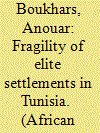

|
|
|
|
|
| Summary/Abstract |
Six years after the revolution that ousted Zine El-Abidine Ben Ali, Tunisia remains in flux. On the face of it, the country should be celebrated for transitioning from political ferment to consensual normalcy. Unfortunately, there is more to Tunisia’s transition to consensual politics than meets the eye. The country is still caught in a turbulent grey zone where strong authoritarian tendencies threaten to pull down the country’s tortuous march towards democratic stability. Some developments are particularly worrisome. The old authoritarian discourse emphasising stability and law and order has regained credence. The repressive habits of the police and security services are also back in full swing. The outlook for democratic stability darkens as the chasm between ordinary citizens and political elites expands. The lurch towards illiberalism and the failure of the successive postrevolutionary governments to make even the slightest dent in Tunisia’s dreadful unemployment rate and sharp regional economic inequalities are undermining faith in elite settlements and state institutions.
|
|
|
|
|
|
|
|
|
|
|
|
|
|
|
|
| 2 |
ID:
154701
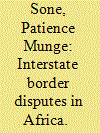

|
|
|
|
|
| Summary/Abstract |
Many researchers have focused on the role colonialism has played in causing interstate border disputes in Africa. Besides the colonial issue, this paper seeks to investigate what other factors fuel interstate border disputes in Africa and determine how effectively the disputes can be resolved. In recent decades, Africa has been tormented by and is still experiencing numerous interstate border disputes which have serious implications for the disputing states. Some of the disputes are resolved, but violations of human rights and instability still occur in these regions. By analysing the content of some relevant documents and with the use of interviews, this paper reveals that most disputing African states rely heavily on foreign intervention (especially by their erstwhile colonial masters) in the resolution of their disputes. It is argued that African leaders need to be more committed and exhibit better leadership in resolving their border disputes, and that they should always seek the expertise of African forums such as the African Union (AU) before calling for foreign intervention. It is suggested that African leaders and the AU understand the problems of Africans better than anyone else, and they are also the ones mostly greatly affected by these disputes. Thus, there needs to be more of a focus on addressing the root causes of disputes in order to avoid them resurfacing, rather than seeking to merely halt them.
|
|
|
|
|
|
|
|
|
|
|
|
|
|
|
|
| 3 |
ID:
154696
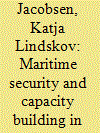

|
|
|
|
|
| Summary/Abstract |
It is widely acknowledged that maritime security in the Gulf of Guinea is a highly complex phenomenon involving a variety of issues (legal deficiencies, inadequate military equipment, and challenges like corruption, political unrest and youth unemployment) as well as a multiplicity of external responders. To make sense of the impact that external actors have when they address this complex problem through various maritime capacity building endeavours, this article argues that there is a need to understand the attractiveness of capacity building vis-à-vis the widely acknowledged need for a comprehensive approach, as well as the difficulties of translating the potential for comprehensiveness into practice (as important aspects of the problem remain largely unaddressed). Further, it is argued that it is important to appreciate that even if these gaps – i.e. the aspects that maritime capacity building currently leaves unaddressed – represent a ‘failure’ to deliver a comprehensive response, they are at the same time illustrative of how the maritime capacity building activities of various external actors also ‘succeed’ in having an impact on this regional security landscape – for instance, by influencing how certain aspects of this multifaceted problem are prioritised, whilst others are only marginally addressed, if at all.
|
|
|
|
|
|
|
|
|
|
|
|
|
|
|
|
| 4 |
ID:
154700
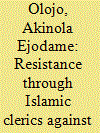

|
|
|
|
|
| Summary/Abstract |
Islamic clerics and scholars constitute one of the community actors affected by the Boko Haram crisis in northern Nigeria. This group is also one that is most familiar with the essential doctrinal elements required to deconstruct the narrative pushed by Boko Haram in a crisis where ideology represents a vital aspect. While not undermining the bearing which socio-economic and political issues have on the crisis, this paper frames the focus to emphasise the long-term battle where Islamic clerics are involved in winning hearts and minds. Drawing upon fieldwork conducted in Sokoto State and Borno State, this paper highlights the influential role of clerics in communal mobilisation and resistance against Boko Haram. It is suggested that a deeper integration of this community actor into the broader counter-insurgency struggle in northern Nigeria would be beneficial.
|
|
|
|
|
|
|
|
|
|
|
|
|
|
|
|
| 5 |
ID:
154699
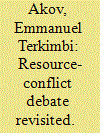

|
|
|
|
|
| Summary/Abstract |
The resource debate is easily discerned as part of the ongoing history of farmer–herdsman conflict in the North Central region of Nigeria. Scarcity theorists are adept at linking scarcity with the onset of livelihood conflict while on the other hand resource abundance pundits insist it is profusion and not scarcity that impels conflict. This article traverses these wrangles and proceeds to downplay the resource polemic altogether. It is proposed that the resource debate, despite its profoundness, presents a narrow reading of farmer–herdsman clashes in Nigeria’s North Central region. It is suggested that a number of other factors, including elite land grabbing, ethno-religious identity construction, weak state capabilities, the citizenship question, corrupt traditional institutions, the lack of an effective land tenure system and a widespread culture of impunity, make for better readings of the conflict. Owing to the negative impacts of the conflict on state and society, it is recommended that the state in Nigeria should commit itself to addressing the citizenship question, strengthening the capabilities of security institutions, extirpating the culture of impunity and revaluing its policy on land redistribution.
|
|
|
|
|
|
|
|
|
|
|
|
|
|
|
|
| 6 |
ID:
154698


|
|
|
|
|
| Summary/Abstract |
While global consensus on the meaning and application of the responsibility to protect (R2P) principle remains tenuous, there is little contention among major actors that the development of the norm should prioritise the prevention of mass atrocities. In particular, Brazil, Russia, India, China and South Africa (BRICS) – which have a role to play that is vital to the future development of R2P as a global norm but which continue to express reservations about the intent and application of the doctrine – have been strong advocates of the preventive aspects of the principle. This rhetorical consensus, however, belies the conceptual and practical challenges that are associated with the prevention of mass atrocities. In this paper, the example of South Africa’s post-conflict reconstruction and development (PCRD) interventions in South Sudan from 2005 to 2013 is used to reflect on the role of external actors in supporting conflict-affected states to implement the preventive aspects of R2P. It is argued that while South Africa, like other BRICS countries, has used the rhetoric that atrocity prevention should be at the core of R2P to legitimise its opposition to military intervention for humanitarian purposes, it has struggled to back this rhetoric with coherent strategies and concrete actions to prevent mass atrocity crimes within its sphere of influence. The gap between rhetoric and practice in the preventive aspects of R2P is not unique to South Africa, but highlights fundamental difficulties inherent to global efforts to prevent mass atrocities.
|
|
|
|
|
|
|
|
|
|
|
|
|
|
|
|
|
|
|
|
|